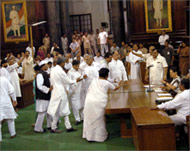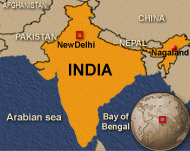Survey damning of Indian MPs
Almost one-quarter of the over 540 people elected to India’s parliament this year face criminal charges ranging from murder to extortion and even rape, a study by an independent watchdog said.

MPs from almost all political parties are involved, but half of the parliamentarians from a powerful regional partner of Prime Minister Manmohan Singh’s coalition are tainted by such charges, which if proved, entail a minimum jail term of five years, the Bangalore-based Public Affairs Centre said.
The report, obtained by Reuters on Wednesday, is based on affidavits filed by politicians before they fought polls to the lower house of parliament under a new rule enforced by the Supreme Court to improve transparency and probity in public life.
“It’s a shocking indictment of the system that one-fourth of our elected representatives to the highest democratic body have criminal cases against them,” said Samuel Paul, chairman of the group which has been campaigning for cleaner politics.
The study gave no figures but said 23.2% of all MPs had been served criminal charges.
Singh has a squeaky-clean image, but his Congress party-led minority government is crucially dependent on a clutch of smaller groups, including the Rashtriya Janata Dal which the report said had the most MPs embroiled in cases of crime.
Almost half of the party’s 23 MP’s were involved, it said.
Overloaded judicial system
 |
|
Anti-corruption legislation was |
Indian election laws allow politicians facing criminal charges to run for public office, debarring them only in case of convictions, which are rare in an overloaded and imperfect judicial system.
On Wednesday, Singh’s cabinet deferred long pending anti-corruption legislation aimed at bringing top public offices within the ambit of an ombudsman.
An official said the cabinet could not discuss the anti-corruption bill because two ministers were not present.
But analysts say the legislation, which was proposed three decades ago, has failed to make headway because politicians have been resisting it.
Assets
More than half the members of the lower house of parliament had assets of over 5 million rupees ($109,400), in a country where a quarter of the billion-plus population lives on less than a dollar a day, the PAC study found.
Real estate was the most popular asset.
Deputies of Singh’s Congress party, for long India‘s party of power, accounted for more than half the assets of all MPs.
The communists, who give vital support to the Congress coalition, had the least wealthy lawmakers, accounting for the largest proportion of deputies with assets of less than one million rupees.
‘Money power’
“A striking finding is the dominance of the richer classes in the electoral arena,” the PAC said. “Money power is truly the entry barrier in this game.”
 |
|
The disparity between MPs and the |
Samuel said there were wealthy politicians in many countries, but the disparity between Indian deputies and those who elected them seemed especially startling. “The average MP is not an ordinary man, he is upper crust.”
Some 260 million Indians still do not have access to wholesome food, basic health or drinking water.
Lawmakers, who helped themselves to a salary hike three years ago, earn a basic salary of 12,000 rupees (about $262), besides allowances.
They are also given heavily subsidised housing, free air and rail tickets, electricity and water.
However, nearly half of all MPs were yet to repay loans to public financial institutions, while nearly 14% owed money to government departments, the PAC said.